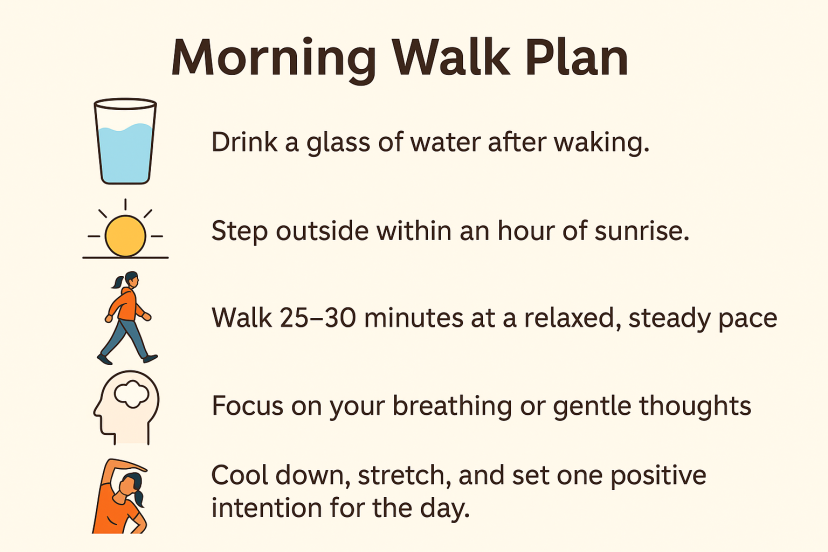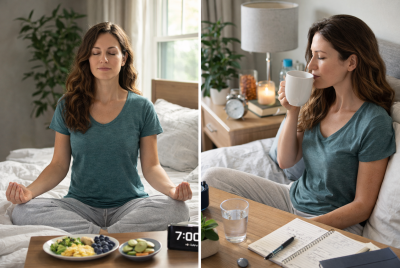How Morning Walks Benefit Your Mental Health
We may earn a commission for purchases made using our links. Please see our disclosure for more details.
You wake up feeling foggy, weighed down by yesterday’s worries and a list of tasks that already feels endless. Your mind races, but clarity doesn’t come—and soon that restlessness drags your mood down. Sound familiar? The solution might be simpler than you think: a morning walk. Morning walks after waking up helps clear your thoughts, boost your energy, and bring back a sense of calm. It’s one of the most underrated yet powerful ways to reset both your mind and body before the day begins.
Why a Morning Walk Makes a Real Difference
A morning walk is known to be effective in improving your mental health. As you move, your body produces serotonin, dopamine, and endorphins, chemicals that naturally improve your mood and focus. The soothing light of morning also helps your body adjust its internal clock, and fresh air activates your relaxation mechanism.
Even five or ten minutes of gentle movement can pull you out of a stressed “fight-or-flight” state and into balance. That’s why so many therapists and wellness experts recommend walking as part of mindfulness or mental health routines—it helps the body move, and the mind follow.
Key Mental-Health Benefits of Morning Walks
1. Stress reduction and improved mood
Starting your day with movement is a quick way to ease tension. Walking lowers cortisol—the body’s main stress hormone—while boosting serotonin, which helps you feel emotionally stable. Research in the British Journal of Sports Medicine found that group walking significantly improved mood and reduced symptoms of depression in people of all ages.
More recently, a 2024 meta-analysis in JMIR Public Health and Surveillance confirmed that walking—whether indoors or outdoors—effectively reduced symptoms of depression and anxiety across 75 clinical trials. The takeaway? Even a short morning walk can help you manage stress and improve your mood as effectively as more intense workouts.
2. Lower risk of anxiety and depression
Morning walks don’t just help in the moment—they also protect your mental health long-term. A JAMA Psychiatry meta-analysis of over 190,000 participants found that people who walked regularly had up to a 25% lower risk of developing depression compared to those who were inactive.
You don’t need to train for a marathon—just steady, moderate walks a few days a week. Over time, the habit builds resilience, emotional balance, and a sense of mental strength that lasts.
3. Better cognition and focus
Walking helps your brain wake up just as much as your body. Increased blood flow brings oxygen and nutrients to your brain, improving concentration, creativity, and memory. Researchers from the University of Illinois found that light to moderate walking activates the prefrontal cortex—the part of the brain responsible for planning and focus. It’s no surprise that many professionals use walking meetings or outdoor breaks to think more clearly.
4. Improved sleep and sustained energy
Morning walks help synchronize your body’s natural rhythm. Exposure to daylight early in the day signals your brain to regulate melatonin, making it easier to fall asleep and stay asleep later. Better sleep brings better mood, steadier energy, and less of that afternoon slump.
5. Emotional balance and self-awareness
The steady rhythm of walking can feel meditative. It slows your breathing and grounds your thoughts, helping you process emotions instead of bottling them up. Many therapists recommend mindful walking—focusing on your breath, movement, or surroundings—as a simple way to calm the mind and build emotional awareness.
How to Build a Morning Walk Routine That Works
Step 1: Prepare the night before
Lay out your clothes, shoes, and fitness tracker ahead of time. A little preparation removes morning friction and makes it easier to follow through.
Step 2: Start small
Begin with 20 to 30 minutes of walking, five days a week. That’s the sweet spot in most studies for boosting mental health. Once you feel consistent, you can extend to 40 or 45 minutes—it’s all about building rhythm, not perfection.
Step 3: Choose your environment wisely
Walk somewhere you enjoy—tree-lined streets, a quiet park, or a trail near water. Natural light boosts serotonin, and greenery provides extra “nature therapy” that helps calm anxiety.
Step 4: Mix it up
Alternate between brisk walks that energize and slower, reflective walks that help you unwind. Varying your pace keeps things interesting and challenges both your mind and body.
Step 5: Pair it with mindfulness
Pay attention to your breathing, the sound of your steps, or the way your muscles feel. This mindful awareness deepens the sense of calm and helps you feel grounded as you move.

Overcoming Common Roadblocks
“I’m too busy.”
Even a 10-minute walk can improve your mood and lower stress hormones. Think of it as a small investment in a better day.
“It’s boring.”
Add a playlist, podcast, or audiobook—or simply use the time to think and reflect. Many people say their most creative ideas come while walking.
“The weather’s bad.”
Dress for the conditions or find an indoor option like a mall or treadmill. What matters most is staying consistent, not where you walk.
“I’m not an early riser.”
That’s okay! A walk within the first few hours after waking still delivers the same benefits. The goal is exposure to daylight and gentle movement—not the clock time.
Recommended Gear to Enhance Your Morning Walks
- Nike Promina Walking Shoes: Cushioned comfort for longer strolls.
- ASICS Gel-Contend 9 Shoes: Supportive hybrid design for mixed terrain.
- adidas Cloudfoam Trainers: Lightweight and budget-friendly.
- Xiaomi Smart Band 10: Tracks steps, heart rate, and sleep trends.
- Smartwatch with BP Monitor: Keeps you motivated with daily progress goals.
Good gear keeps you comfortable and helps turn your morning walk into a lasting habit.

A Simple Morning Walk Plan
- Drink a glass of water after waking.
- Step outside within an hour of sunrise.
- Walk 25–30 minutes at a relaxed, steady pace.
- Focus on your breathing or gentle thoughts.
- Cool down, stretch, and set one positive intention for the day.
If you often feel mentally sluggish or distracted, pairing your walks with good hydration, balanced nutrition, or brain fog supplements can help enhance focus even more.
Why Morning Walks Support Long-Term Mental Well-Being
Morning walks don’t just lift your mood for a few hours—they reshape your brain’s response to stress over time. Consistent physical activity improves cognitive function, reduces inflammation, and enhances emotional resilience. People who walk regularly often report greater satisfaction, lower burnout, and a more positive outlook on life.
The studies in JAMA Psychiatry and JMIR Public Health and Surveillance reinforce this idea: simple, consistent walking matches the mental health benefits of structured workouts. You don’t need fancy gear or gym memberships—just a bit of daylight and the willingness to move.
After all, staying active is one of the most powerful forms of therapy. Each step you take in the morning helps balance your body, clear your mind, and strengthen your emotional health.
Conclusion
A morning walk is one of the simplest ways to care for your mind. It lifts your mood, boosts focus, eases anxiety, and helps prevent depression—all without spending a cent. Every sunrise offers a new chance to reset. So lace up your shoes, step outside, and take that first breath of fresh air. Let your thoughts quiet down as your body moves forward—because sometimes, peace really does come one step at a time.
FAQ
Q1: How long should my morning walk be?
About 20 to 30 minutes most days of the week is ideal for improving mood, focus, and energy.
Q2: Can short walks help too?
Definitely. Even 10 minutes can lift your spirits and calm anxiety when practiced consistently.
Q3: Do I need nature for it to work?
Nature adds extra benefits, but any outdoor or well-lit environment provides real results.
Q4: Is walking enough exercise overall?
For your mental health, yes. Walking is low-impact, sustainable, and backed by strong evidence. You can always add other forms of movement later.
Q5: What should I do if I don’t manage to walk one day?
Don’t worry. Progress comes from consistency, not perfection. Pick it up the next day—your body and mind will thank you.




